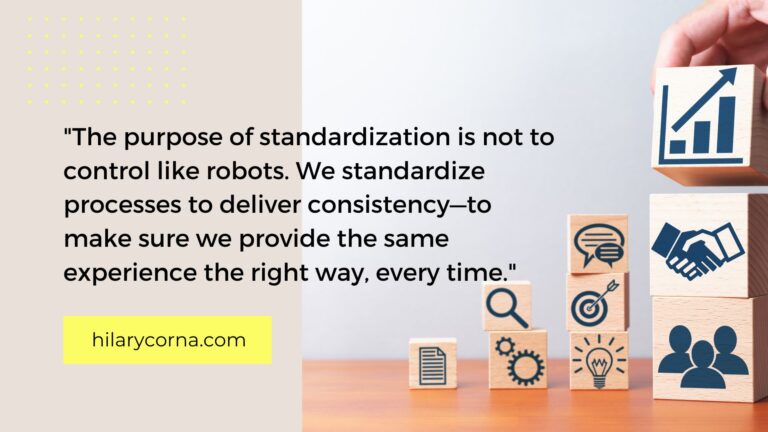Losing fluidity and agility is a common concern for service-based companies when standardizing and building expectations around their processes. They are worried that standardization might hinder them from serving their customers in the way they do best.
There is that fear that standardizing processes will take away the human element of the way they do their work which is what makes their company unique. But this is mainly due to the misconception that standardization’s purpose is to control how an organization does things.
The real purpose of process standardization
We standardize processes to deliver consistency—to make sure we provide the same experience the right way, every time. That does not mean we build compliance. The purpose of standardization is not to control like robots.
Within a process, what we want to standardize are things that are replicable. And we want to humanize the things that are not. For example, you can standardize how you respond to objections. Your pitch template and branding should always be the same. We only pull out the things that need to be standardized and leave the ones that don’t.
Standardization does not mean inflexibility
Standardized processes do not mean inflexible processes. In fact, standardization can often help organizations to identify areas of their processes that can be streamlined, leading to increased flexibility and agility.
Standardization involves defining best practices and creating a consistent way of doing things, but it does not mean that there is no room for flexibility or adaptation. Standardized processes can still be designed to allow for variation or modification based on changing business needs or customer requirements.
My sales process, for example, is well-structured and standardized yet I can still be fluid. If I recognize there is a need for another follow-up, I’ll do it. If I recognize there is a need to go deeper in one area, I’ll do it. I know where I can be agile, have autonomy and make better decisions.
Standardization can create a foundation for innovation
Standardization provides a consistent framework for operations, freeing up employees to focus on creative problem-solving and innovation. By removing the need to constantly reinvent the wheel, standardized processes can actually facilitate more experimentation and exploration.
The hidden secret
What makes you great is not going to be lost in process standardization. Instead, it will take everything that makes you great—standardize your best practices—and make sure it happens every time.
Process standardization can actually enhance your company’s agility and fluidity by providing a consistent foundation for operations and freeing up employees to focus on innovation. By implementing standardized processes, your company can achieve a balance between consistency and agility, enabling you to thrive in today’s fast-paced business environment.
Ready to get started on this process in your own company? If so, I have something for you.
The Flow State Workshop is a 2-day virtual experience where I take senior leaders through one of my favorite tools to map out their flow of goods and information over time. You may know this as process mapping.
But it’s not just any tool we are using together. This is THE tool that Toyota used for everything during my years of working with them.
So who is this workshop for exactly? It’s for service-based businesses who are looking to get crystal clear on the current state of their business so that they have a very strong foundation to solve problems.
In love and respect,
Hilary Corna














